Research in the Arts and Sciences
CAS Interdisciplinary Research Talks
Faculty members across all CAS divisions have expressed the desire for more opportunities for interdisciplinary dialogue and potential collaborations. In response, CAS organizes a series of interdisciplinary talks over the academic year.
CAS IR Talk presentations will be 40-50 minutes in length followed by a question-and-answer session. The faculty members presenting will speak to a general audience of faculty from across the CAS.
The talks scheduled for 2021-22:
Location: View recorded talk
Dave Sutherland, Associate Professor, Earth Sciences and Environmental Studies
Mark Carey, Professor, Environmental Studies and Geography
Casey Shoop, Senior Instructor of Literature, Clark Honors College
“Beyond the tip of the iceberg: Exploring the meaning of Greenland ice from interdisciplinary perspectives”
Abstract: Icebergs crashing into the ocean from Greenlandic glaciers are a powerful symbol of climate change today. However, how representative are they of impending climate doom, and how do we think about icebergs, and ice in general, in context of the cultures, people, and environment local to the Greenland continent? We will explore the meanings of ice from the perspective of natural science, social science, and the humanities, and ask what we can learn together that we cannot learn using only our disciplinary lenses. Much of our talk will stem from two shared experiences: 1) a field excursion to Greenland in summer 2019 and 2) a new interdisciplinary course we co-taught in spring 2020 on Arctic Ice.
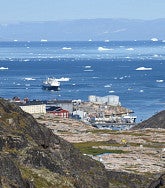
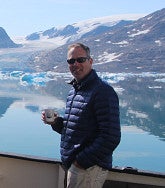
Dave Sutherland is a physical oceanographer who uses observations and numerical simulations to explore coastal and estuarine systems. In particular, he is focused on the dynamics of glacial fjords (e.g., Southeast Alaska, Greenland, Antarctic Peninsula) and Pacific Northwest estuaries (e.g., Coos Bay, Puget Sound) and how humans interact with these environments. He has received numerous grants from the National Science Foundation, NASA, Oregon Sea Grant, and NOAA that support his research and students.
Mark Carey serves as the current Director of the Environmental Studies Program. His research focuses on the human dimensions of climate change, ice, and water, with a particular focus on the Andes and the Arctic regions. He generally works in larger multidisciplinary research teams, especially with glaciologists, climate scientists, oceanographers, and many other social science and humanities fields. He runs the Glacier Lab for the Study of Ice and Society, where he prioritizes collaboration with students at all levels and across many disciplines.
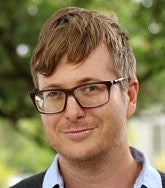
Casey Shoop is a Senior Instructor of Literature at the Clark Honors College and recipient of the Thomas F. Herman Award for Specialized Pedagogy. Trained primarily in North American literature and film, he uses an interdisciplinary approach in his classes to gather a range of texts, ideas, and discourses on diverse subjects, including climate change, to integrate the environmental and physical sciences, comparative biology and ethology with methods in literary and cultural theory.
Stacy Alaimo, Professor, English and Environmental Studies
Svetlana Maslakova, Associate Professor, Biology and Oregon Institute of Marine Biology
“Remembering the Surreal Seas of William Beebe and Else Bostelmann: Science and Aesthetics in the Abyss”
Abstract: Within current conceptualizations of the Anthropocene, when even the bottom of the sea bears the marks of human incursions, what does it mean to remember the half-mile ocean descents of William Beebe in the 1930s? Beebe’s encounters with abyssal creatures seem to have solidified his rejection of the separation of science from the aesthetic, as he describes himself being captivated by the very “specimens” he would capture. Meanwhile, artist Else Bostelmann’s surreal stylizations of the deep sea life from these descents suggest weird abyssal worlds, creaturely perspectives, and the ungrounding of anthropocentric knowledge.

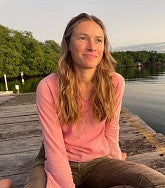
Stacy Alaimo is Professor of English and Core Faculty Member in Environmental Studies. She is the author of Undomesticated Ground: Recasting Nature as Feminist Space (2000); Bodily Natures: Science, Environment, and the Material Self (2010) which won the Association for the Study of Literature and Environment book award for Ecocriticism; and Exposed: Environmental Politics and Pleasures in Posthuman Times (2016). Alaimo is currently writing a book entitled Deep Blue Ecologies: Science, Aesthetics, and the Creatures of the Abyss and co-editing a book series at Duke UP called “Elements.”
Svetlana Maslakova is an Associate Professor at the Oregon Institute of Marine Biology and the UO Biology Department. Her area of expertise is the biology of ribbon worms (phylum Nemertea) from evolution of embryonic and larval development to describing new species. Her work documenting marine biodiversity takes her to many parts of the world. Two marine invertebrate species are named after her. She is an author of over 40 scientific publications, including four book chapters and co-presenter of “Blow up: Artistic Microscopy” (Coos Art Museum, 2009).
Location: View recorded talk
Barbara Muraca, Associate Professor, Philosophy and Environmental Studies
Trudy Ann Cameron, Professor Emeritus, Economics
“Why protect nature? The multiple values of human-nature relationships”
Abstract: For decades the question about why nature should be protected has had two different answers: because nature matters for its own sake (intrinsic value), independent of how it affects people, or because of the benefits people derive from interacting with nature (instrumental value). While the first perspective rejects instrumental justifications for conservation and considers anthropocentrism as part of the problem, the second one highlights anthropocentric arguments and employs economic valuation to assess the importance of ecosystems to people. But does it have to be one or the other? Recent research suggests a third possibility: protecting nature because of the meaningful relationships that connect people to nature, and to each other through nature. These so-called relational values remain anthropocentric, but are not instrumental justifications for conservation. We will discuss the relevance of anthropocentric arguments for conservation, how relational values can be assessed, and the opportunities and limits of economic valuation.
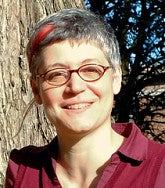
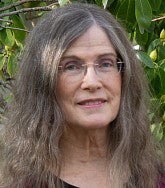
Barbara Muraca, Ph.D., is Associate Professor in Philosophy and Environmental Studies. Her research focuses on the diverse values of human-nature relationships and on theories sustainability and Degrowth for a radical social-ecological transformation. She is Lead Author in the current Assessment Report on the Multiple Values of Nature by IPBES (Intergovernmental Science-Policy Interface Platform on Biodiversity and Ecosystem Services).
Trudy Ann Cameron’s research specialty is the use of survey-based choice experiments to measure society’s willingness to give up other goods and services to protect or enhance both human health and ecosystems services. Before moving to emeritus status in July of 2021, she held the Raymond F. Mikesell Chair in Environmental and Resource Economics at the University of Oregon. She is a past president of the Association of Environmental and Resource Economists (AERE), an AERE fellow, and a fellow of the Canadian Resource and Environmental Economics Association (CREEA|ACERE).
Location: View recorded talk
Leigh Johnson, Assistant Professor, Geography
Richard York, Professor, Sociology and Environmental Studies
“Unintended Consequences of Energy Transitions”
Abstract: Transitioning away from fossil fuels requires the production of energy from non-fossil sources. However, quantitative analyses and historical assessments of previous shifts in energy use indicate that the expansion of non-fossil energy sources – in the absence of direct efforts to suppress fossil fuel extraction and challenge the power of the fossil fuel industry - may not appreciably contribute to a decline in fossil fuel use and may have a variety of unintended consequences. These analyses suggest that a full energy transition to cleaner energy sources requires not only technological developments but changes in economic structures and political power relationships.
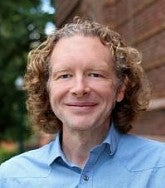
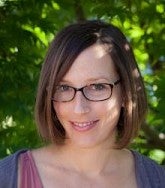
Leigh Johnson is a human geographer focusing on the intersection of disaster and climate risk, vulnerability, labor, and finance. Her research investigates how configurations of public and private sector actors and financial arrangements shape disaster vulnerability and influence people's everyday socioecological reproduction.
Richard York is an environmental sociologist whose work combines human ecology and political economy. He is both a theorist and an empirical researcher, who primarily uses quantitative methods. One focus of his research is on how the structural characteristics of societies, including demographic, economic, and technological factors, influence levels of resource consumption and pollution emissions.
Location: View recorded talk
Leif Karlstrom, Associate Professor, Earth Sciences
Jeffrey Stolet, Professor, Music Technology
“The Volcano Listening Project”
Abstract: Volcano science is undergoing a data revolution facilitated by rapid technological development that is dramatically increasing the real-time detail of scientific observations. The Volcano Listening Project is an effort to study data by representing it through sound, recognizing that complex temporal signals seen at volcanoes can often be understood aurally. We are developing algorithms and approaches to combine data sonification and visualization that sit at the intersection of data science, volcanology, and modern music. We will explore this intersection of art and science by discussing how data sonification can enable volcano science, and how volcanic data may inform human expression through music composition and performance.
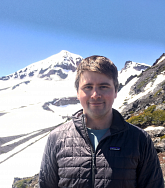
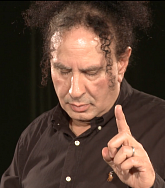
Leif Karlstrom is an associate professor in the Department of Earth Sciences. He studies fluid motions in and on volcanoes, landscape evolution, glaciology, and geodynamics. Leif also has an active professional music career as a classically trained violinist.
Jeffrey Stolet is a professor of music and a former Philip H. Knight professor at the School of Music and Dance. He performs his computer music compositions around the world and lectures about data-driven sonic outcomes.
Location: View recorded talk
Melissa Baese-Berk, Associate Professor, Linguistics
Santiago Jaramillo, Associate Professor, Biology
"What mouse brains can tell us about second language learning"
Abstract: Learning a second language as an adult is notoriously challenging. In particular, learning to distinguish sounds that do not exist in your first language can be very difficult. Studies in humans have provided great insights into variables that influence learning these new sounds, yet reduced experimental access in humans limits our understanding of the brain processes that make this type of learning possible. Neuroscience work using animal models allows for a detailed investigation of the neural signals and changes in neural connections that underlie learning to distinguish novel sounds. In this talk, we present the first steps of our interdisciplinary work looking at what mouse brains can tell us about language learning. This work is designed to use insights from human behavioral work to investigate neural processes in mice, which in turn will provide hypotheses to be tested in additional human behavioral experiments.

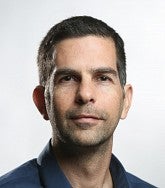
Melissa Baese-Berk is an Associate Professor of Linguistics and the David M. and Nancy L. Petrone Faculty Scholar. Her work focuses on how people understand and produce language, and how people learn languages later in life.
Santiago Jaramillo is an Associate Professor of Biology in the Institute of Neuroscience. His research uses mice to investigate the neural mechanisms responsible for how the brain interprets the acoustic world.
CAS Research Reputation
The research activity—and reputation—of faculty in the College of Arts and Sciences is the basis for the UO’s status as a Carnegie Research I institution and a member of the Association of American Universities (AAU). In the past five years alone, faculty accolades in the College of Arts and Sciences have included:
- One faculty member elected President of the American Association for the Advancement of Science
- Four faculty elected to the National Academy of Sciences
- Five faculty elected to the American Academy of Arts and Sciences
- Two faculty named Guggenheim Fellows
- Ten faculty elected to the American Association for the Advancement of Science
- Six Fulbright scholars
All tenured-related faculty in the College of Arts and Sciences, across the Humanities, Social Sciences and Natural Sciences are required to be engaged in an active research program and make original contributions to their respective fields of knowledge. Many are involved in collaborations in one of the two dozen research institutes and centers affiliated with the College of Arts and Sciences.
For CAS faculty wishing to learn about faculty research resources, click here.

